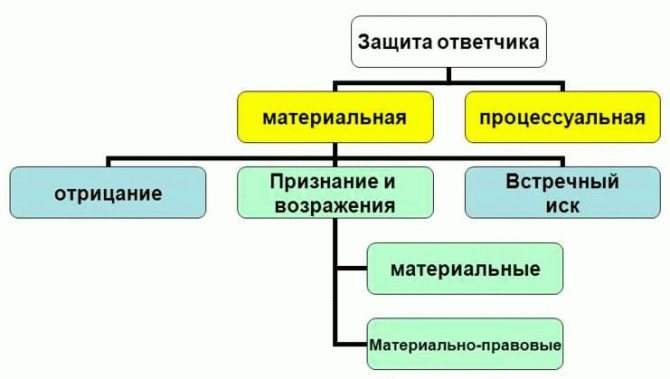Why are objections to objections filed?
As mentioned above, endless objections are an analogue of an ordinary squabble. It seems that the practice of objecting to objections was initially started by lawyers who realized that this inherently unnecessary statement could bring additional fees.
But the idea has caught on, and objections to objections are written everywhere, despite their zero procedural value.
There is an opinion that objections to objections can serve as an analogue of clarification of claims. There is no basis for such a statement.
To clarify the claims or change them, there is a separate procedural document, which is exactly what is called “Application to amend (clarify) the claims.” Moreover, requirements can be changed and clarified orally during the consideration of the case.
How to make an objection
If you decide to refute the defendant’s arguments, then you will need to draw up objections to the objections according to the rules for drawing up a response. The basis for writing objections will be the incorrect information that the defendant provided in his response to the statement of claim.
Accordingly, the arguments for objections to objections will need to be supported by documents.
You should start writing your objections from the “header”, which is located in the upper right corner of the sheet. The header includes the name of the judicial body to which the paper will be served, and the last name, first name, patronymic and place of residence of the plaintiff writing the objection.
Immediately under the “heading”, the phrase “Objections to the defendant’s objections in civil case No. _____,” the descriptive part begins. It must include direct comments on the defendant’s response or a refutation of his arguments.
The descriptive part ends with the words “Based on the above, I request.” The request itself relates to the operative part of the document and must contain a clearly expressed desire as to what exactly you want from the court and why objections to objections were written.
In the lower left corner of the sheet there is a list of documents attached to the objection.
The sheet ends with the date of filing the objection and the signature of the plaintiff.
What can you ask the court to do in your objections?
Since the law does not regulate this kind of procedural document, it is worth assuming that you can ask for anything, as long as it does not contradict the law and the purpose of writing objections.
Let us note that the request that may be contained in the objections to the objections is legal nonsense for the following reasons.
The fact is that the parties to a civil process are procedural opponents, and the task of the court is to figure out which of them is right. The plaintiff sets out his position in a statement of claim, in an additional statement of claim, or in a statement to amend (clarify) the claims.
Expert opinion
Gusev Vladislav Semenovich
Lawyer with 10 years of experience. Specializes in criminal law. Member of the Bar Association.
The defendant indicates his position by providing a response or objection to the statement of claim, as well as filing (if he has his own requirements) a counterclaim.
That is, all procedural activities of the parties to controversial claims are actions aimed at challenging the opponent’s evidence, or, more simply, actions that can persuade the court to believe one side and not believe the other.
Accordingly, objections to objections are an attempt to indicate to the court that the defendant’s arguments cannot be trusted. However, the operative part of the objection cannot read “dear court, do not believe the defendant.”
Therefore, objections to objections often contain formulations such as “I ask you to recognize the defendant’s objections as invalid or inconsistent with the real circumstances of the case.”
What to write
The Civil Procedure Code of the Russian Federation does not establish separate requirements for an objection; The Code of Civil Procedure only mentions the possibility of providing such an act.
The applicant must briefly, clearly and clearly state how he sees the controversial situation and on what rules of law he bases his position. Build sentences so that they do not look complicated and can be understood by anyone.
State the main points in paragraphs and do not write everything in one text, so you can focus on specific circumstances.
Expert opinion
Davydov Alexander Yurievich
Civil law consultant with 20 years of practice. Author of numerous articles on legal topics
Each procedural document has a certain structure, following which you will not find it difficult to ask how to write an objection to a statement of claim and make it reasoned.
The structure includes the following parts:
- introductory - this part indicates the name and address of the court hearing the case; names and addresses of the parties involved in the case; name and contact details of the applicant; case number; surname and initials of the judge who is considering the case;
- descriptive - at this stage the applicant sets out the position from his point of view, based on the subject of the dispute. The indication occurs briefly, on those points that were initially indicated in the statement of claim;
- motivation - this part contains references to legislative acts confirming the applicant’s position; it is also possible to refer to practice that has a similar subject matter;
- operative - in conclusion, the applicant expresses his demand to the court, for example, asks to completely refuse to satisfy the claims; indicates a list of applications on which the stated position is based; puts date, details and signature.
This is important to know: Receiving a subsidy for the purchase of housing
For a clearer understanding of the structure of the document, you should use the following example of an objection to a statement of claim.
Example of an objection to a statement of claim
В________________________________ (Indicate the name of the court and its address)
From: defendant _____________________ (indicate last name, first name, patronymic, residential address and contact information)
Plaintiff: ____________________________ (indicate last name, first name, patronymic, residential address and contact information)
Case No. ____________ (indicate the case number)
Objection to the claim
The plaintiff, (indicate the full name of the plaintiff), _________ (indicate the date of filing the statement of claim) filed a lawsuit in which the plaintiff demands _________________ (further indicate the demands put forward by the plaintiff. The plaintiff’s demands must be stated clearly and accessible with all the necessary details relevant to the proceedings).
I do not agree with the plaintiff’s demands because _______________________ (further it is necessary to indicate your own point of view on the plaintiff’s claims, supporting objections with references to legal norms or available evidence that could refute the plaintiff’s claims).
Thus, I believe that the satisfaction of the claims made by the plaintiff must be denied to him, since the satisfaction of his claim contradicts _________________________ (indicate regulatory legal acts and their articles that refute the claims made by the plaintiff).
Guided by the above, as well as the norms of the legislation of the Russian Federation,
1) Deny the plaintiff, (indicate the full name of the plaintiff), to satisfy his claims (further it is necessary to indicate whether the plaintiff’s claim should be fully or partially denied).
2) Attach my objection to the statement of claim in case No. _____ (indicate the case number) to other documents involved in the trial.
I am attaching the following documents to the objection:
1) A copy of the objection to the claim based on the number of participants in the trial.
2) Copies of documents confirming the defendant’s objections to the claim (certificates, checks, receipts, other documents relevant to the case).
Date______________ Signature_______________ (date of filing the objection to the claim) (signature of the defendant with transcript)
Anyone can write an objection to a civil claim if they are involved as a defendant in a civil case. This will help you obtain protection of your legitimate interests. Let's learn about the features of the procedure.
Types of objections
In the legal literature, there are several types of objections to a claim:
- Substantive objections;
- Procedural objections.
The first type includes statements that challenge the plaintiff’s claims. The defendant may ask the court to recognize the plaintiff’s claims as unfounded, and the court will recognize them as such if the defendant proves this. Therefore, when drawing up such an objection, the party must find facts that completely refute the plaintiff’s arguments.
The second type of objection is filed when a party tries to prove that the claim cannot be considered in court. In this case, the party must provide evidence that the dispute that has arisen is not within the jurisdiction or jurisdiction of this government agency or that the claim could not be accepted on other grounds.
For example, if disputes that have arisen between citizens are resolved by other government bodies, the statute of limitations has expired or a court decision has already been made on this dispute, which has not been appealed and has entered into force.
Also, such an objection is filed if the statement of claim was filed by an incapacitated or unauthorized person, for example, with an expired power of attorney.
Please note! When drawing up an objection, it is important to carefully study the case materials and correctly determine which position will be more advantageous.
Regulatory regulation
The consideration of any case in a civil lawsuit occurs between two parties - the plaintiff and the defendant. They have equal rights before the law, so each participant in the process can present their own arguments to defend their position on the case under consideration.
The justice authorities will take the side that can present more evidence to confirm the correctness of their words.
Therefore, a citizen can file an objection to a civil claim if, after reading the claim, he does not agree with its arguments, conclusions and claims. This norm is directly regulated by clause 2, part 2, art. 149 Code of Civil Procedure of the Russian Federation. In addition, not only the defendant, but also other participants in the process interested in the outcome of the case have the right to file objections.
Reasons for writing a counterclaim
There can be many reasons for preparing a response to a received statement of claim.
Let's point out just a few of them:
· provision of necessary documents;
· carrying out additional examinations of real property damage;
· obtaining results of assessment of material damage;
When filing objections, a citizen must take care of the reliability and persuasiveness of the evidence presented in the case. Otherwise, newly discovered circumstances will not be able to influence a favorable outcome of the case for the defendant.
Rules for drawing up objections
There is no specially designed form for filing objections to a statement of claim in civil proceedings, but the statement should be written in compliance with generally accepted standards in judicial records management:
- the document is drawn up in writing;
- Handwritten writing is allowed, as well as typing using printing devices;
- is not a mandatory document in civil proceedings. If a person does not consider it necessary to present evidence of his rightness, then he can simply not write anything.
At the same time, the judge will delve into the case more carefully and make a final decision if the citizen presents additional arguments and evidence in writing. That is why raising objections to the plaintiff’s claims is an important point when considering civil cases.
What points should be contained in objections:
- name of the judicial authority;
- information about the plaintiff, defendant or other interested party;
- details of the case under consideration, as well as information about the participants in the process;
- state the essence of your objections with reference to the provisions of the law, reflect information about the presence of indisputable evidence;
- put forward your request to the court - partially or fully refuse the plaintiff’s stated demand;
- list of attached documents;
- at the end the date and personal signature of the defendant are placed.
You should be more careful when drafting objections, since the document helps protect the rights and interests of the citizen. The outcome of the case depends on the credibility of the arguments and evidence presented.
Each person can independently draw up objections to a civil claim. For your convenience, we have prepared a sample that will help you submit your application correctly.
If you have difficulty completing a document, you can always seek the help of a lawyer. The specialist will not only prepare the form, but will also be able to represent interests at the court hearing.
Documents supporting the opponent’s arguments may be:
- letters and envelopes;
- checks, receipts, payment orders;
- receipt, loan agreement;
- travel documents, etc.
If copies of documents are presented to the court, they must be notarized; in this case, it is not necessary to present the original documents to the court.
General provisions
The legal basis for presenting objections in civil proceedings is Article 149 of the Code of Civil Procedure of the Russian Federation. The defendant has the responsibility to study the claims and the grounds for their presentation. Based on the results, a document is being prepared containing disagreement regarding the plaintiff’s claims.
Each participant in the process strives to complete the proceedings as quickly as possible. With the help of a reasoned rebuttal, the defendant at the stage of preparing the case for consideration can present his own position, based on evidence.

A person may partially admit that the applicant is right. For example, if a case of collection of debt on a loan is being considered, then the debtor admits the existence of unfulfilled obligations, but indicates an unlawful overstatement of the penalty. In this situation, the court may give time to conclude a settlement agreement and complete the process.
This is important to know: What to do if you lost your passport: how to restore it and the consequences of loss
In addition, evidence that will be used by the defendant in court is attached to the objection. There is no need to hide them, since the plaintiff will have to become familiar with new circumstances. It is better for the other party to study them in advance and be ready to continue the process.
If the response to the statement of claim is sent well before the preliminary hearing, this will help significantly speed up the process. The judge will study the document in advance, examine the evidence presented, and form a certain position. In this case, already at the first meeting it will be possible to move on to the main stage of consideration of the case.
In practice, there are 2 types of documents under consideration. An objection to a statement of claim can be material when the defendant presents a refutation on the merits of the claims.
For example, an application was sent to the court to collect a debt on the basis of a previously concluded agreement. The alleged debtor, having familiarized himself with the claim, replies that he and the plaintiff entered into an additional agreement regarding unfulfilled obligations.
Based on this document, the person considers forced collection of debt to be unlawful.
You can file a procedural objection in the following cases:
- the statute of limitations has expired;
- demands are made against the wrong person, the defendant must be replaced;
- the dispute was previously considered in court and a decision was made;
- jurisdiction is violated (for example, the parties to the agreement indicated a different body in which disputes should be considered);
- the applicant does not have the right to file a claim (for example, the citizen was declared incompetent);
- in other cases.
If it is possible to refer to the impossibility of considering a claim in a particular case, it is better to do so. This way, the defendant will stop the trial at the preparation stage, saving time and money.
For example, an objection is filed against a claim for collection of debt that arose more than 3 years ago. The person does not need to prove that he paid the required amount or that the obligation was fulfilled in another way.
The application cannot be accepted for consideration, since the statute of limitations established by Article 196 of the Code of Civil Procedure of the Russian Federation has expired.

Procedure for filing objections
Expert opinion
Gusev Vladislav Semenovich
Lawyer with 10 years of experience. Specializes in criminal law. Member of the Bar Association.
After the application has been written and the documents have been prepared, you should decide on the method of submitting the document. Several delivery options are available to all citizens:
- hand over in person through the court office;
- send by registered mail;
- use the services of a courier service.
If the defendant has engaged a representative to protect his interests, then it is necessary to take care of the power of attorney. To confirm his authority, the document must be certified by a notary office.
When to file objections to a counterclaim
Citizens must understand that objections cannot indicate existing claims against the plaintiff. The document reflects only information to refute or clarify the main points of the statement of claim. In cases where the defendant has personal claims of property, material or other kind, a counterclaim is filed.
This application can be filed at any stage of civil proceedings, but this must be done before the end of debate in court. This means that the judge will give the last opportunity to submit petitions to the petition justice authority.
Upon receipt of the counterclaim, the trial will be postponed. The judge will examine the received application and make one of the following decisions:
- about accepting a claim for proceedings;
- about refusal to accept.
If it is decided to accept the application, then a duplicate of the counterclaim is served on the defendant. The citizen is given time so that he can calmly familiarize himself with the document. During this period, a person decides to write an objection or a counterclaim.
If a citizen does not plan to send his objections in writing, then he can orally express his personal position on the existing claim. His statements and arguments will be recorded in the minutes of the court hearing.
You should not neglect the rules for filing objections, as this document can improve the defendant’s position in the case and protect his rights, so we recommend seeking help from experienced lawyers.
Also write to us via online chat or form on the website.
If you have been given the role of a defendant in legal proceedings, you need to think in advance about protecting your own interests. For this purpose, an objection to the statement of claim is drawn up in court. In this document, the defendant can state his own position on the case and question some provisions of the claim, including the plaintiff’s claims.
Of course, you can prove the validity of your own position on the case orally, but the written version allows you to record existing procedural violations on the part of the plaintiff. In addition, such a method of expressing one’s opinion regarding the process has more weight than an oral statement.
If you can provide more evidence of your case than the plaintiff presents, the judge will rule in your favor.
However, an objection is made only after familiarization with the provisions of the claim. It is necessary to study the subject, the grounds for filing the application, the evidence and the references to the law provided.
It is also worth checking whether the procedural rules and deadlines for filing a claim have been followed. In addition to the defendant, other parties to the proceedings, including third parties, may object.
But this will require compelling reasons.
Concept and types
In administrative, arbitration and civil proceedings, the most important principle is the principle of equality of arms, which provides equal procedural opportunities to the plaintiff and the defendant.
Dear readers! The article talks about typical ways to resolve legal issues, but each case is individual. If you want to find out how to solve your particular problem , contact a consultant:
8 (800) 700 95 53
APPLICATIONS AND CALLS ARE ACCEPTED 24/7 and 7 days a week.
It's fast and FREE !
An objection to a claim is a way to protect the rights of the defendant. It represents the defendant’s explanations, which convince the court of the unlawfulness of the claims brought against him.
There are several classifications of the defendant's objections:
- by subject;
- by expression of will.
The subject of the objection may be:
- Objections regarding substantive law – objections to the content of the statement of claim. This may be a disagreement with the position of the plaintiff and an indication of the unreliability of the information provided by the plaintiff to the court. Such objections may result in the claim being denied.
- Objections regarding procedural law – objections regarding the occurrence and continuation of the process. For example, the representative of the defendant sets out in the petition the grounds for recognizing him as an improper defendant in the dispute or the grounds that such a dispute has already been the subject of consideration by the court. Such objections may result in the termination of legal proceedings.
By expression of will, objections take the following form:
- Denials of facts - the defendant in court declares that he does not agree with the plaintiff. This is convenient in cases where the plaintiff does not provide evidence of his judgments to the court. There is no evidence, the defendant does not agree and, therefore, the defendant is right, since the litigant must prove the facts stated in his statements.
- Explanations of the defendant (objections in the proper sense) - the defendant does not simply deny the plaintiff’s words, but gives the court an explanation on the merits of the case. Such explanations must be based on legal facts, so the court will require the defendant to present evidence of his words.
You can also separately distinguish this type of objection as a counterclaim.
A counterclaim is a claim of the defendant expressed in the form of a statement, stated in the initiated process for parallel consideration with the original claim.
It is possible to submit a counterclaim before a decision is made in the court of first instance , that is, both during the preparatory stage of the trial and in any part of the consideration of the case in the first instance. Such statements are subject to all the rules for drawing up ordinary claims provided for in the articles of the civil procedural code (payment of fees, requirements for form and content).
There are also special requirements when filing counterclaims in court. A judge can accept a counterclaim only if it satisfies one of the following requirements:
- the demand is sent for the purpose of offsetting the original claim (the bank files a claim for collection of debt under a short-term loan agreement, and the defendant to the bank’s claim on the loan simultaneously files a claim for recovery of unjust enrichment from the bank);
- if the defendant's claim is satisfied, the possibility of satisfying the plaintiff's claim will be eliminated (the plaintiff files a claim for divorce and division of jointly acquired property, and the defendant simultaneously files a claim for the invalidation of the marriage);
- there is such a close connection between the counterclaim and the original that the court considers it necessary to consider them simultaneously to speed up the process (acceptance of a “closely related” counterclaim remains at the discretion of the court).
When can and should you file an objection?
This document must be prepared in writing. It includes all the defendant’s arguments regarding the plaintiff’s claims. It is important to describe where you disagree with them. This will be the main basis for filing an objection. It must also be submitted in the following cases:
- the person preparing the objection completely disagrees with the position of the plaintiff, while proving the absence of guilt or damage caused (involvement of witnesses, submission of documents, examination results, etc.);
- the defendant or another party to the proceedings does not agree with some of the plaintiff’s demands or arguments (usually objections arise regarding the amount of recovery, then you have to prepare your own calculations, attaching them to the document);
- the plaintiff committed procedural violations, which makes it possible to cancel the claim or refuse to satisfy it (when an inappropriate defendant is chosen, jurisdiction is incorrectly determined, the statute of limitations has expired, etc.).
However, in order for your application to be accepted for consideration, you must comply with the deadlines for its submission and the rules for drafting it.
Objections to the plaintiff's arguments
The defendant has the right to object to the claim orally.
In this case, the arguments regarding disagreement with the demands presented will be transcribed using an audio recording of the court hearing and must be recorded in the minutes.
Objections to the claim may be aimed at indicating the presence of procedural errors in the received document or an incorrect choice of rules governing the current situation.
The complex of violations seen in the claim must be presented in its entirety, and in no case should it be focused only on formal grounds for refusing to satisfy it.
This is important to know: How to get money from the government: subsidies for small businesses
The stated circumstance only emphasizes the importance of an objection to the claim and, accordingly, the need for completeness of its formulation.
What is the deadline for filing an objection?
If a sample objection to a statement of claim to the court is already ready, you need to check the very possibility of filing it. Such a document is submitted to the same judicial body in which the main claim is being considered.
You can present it either in person, during a court hearing, or by sending it by mail when the proceedings are held in another city or region. An objection can be filed at any stage of the process, but before the court makes a final decision.
Expert opinion
Gusev Vladislav Semenovich
Lawyer with 10 years of experience. Specializes in criminal law. Member of the Bar Association.
The best option is to send this document before the start of the meeting, immediately after familiarization with the case materials. It is prepared in several copies, one for each participant in the case and one for the court.
It will be added to the rest of the materials. In addition to the objection, documentary evidence of the facts stated in it is presented.
It can be submitted both in civil and arbitration proceedings. Although it is worth distinguishing between an objection and a counterclaim.
If you draw up the first according to the rules of the second, the document will be refused.
What to do if the bank filed a claim in court for credit debt?
The bank has every right to file a claim in court after the formation of a sufficiently large debt under the loan agreement. When it is filed, you will receive a registered letter, after which you will be officially notified of this claim.
These registered letters are sent with return receipt requested, meaning the postmark on the envelope will be the exact date indicating exactly when you were notified. However, it is still worth receiving the letter as soon as you have the opportunity.
This is important to know: Appealing against unlawful actions of bodies and officials
How to distinguish an objection from a revocation and a counterclaim?
Many defendants confuse this document with a counterclaim or response to the claim. It only needs to refute or clarify the main points of the claim.
But if you present your own demands to the plaintiff, then this will be considered a claim. In this case, claims can be not only material, but also of any other nature.
When filing a claim, do not forget to pay the state fee.
A response to a statement of claim is also different from an objection. However, a review is prepared only in some proceedings, and it only sets out the circumstances relevant to the materials of the trial.
They write a review even if the defendant agrees with the plaintiff’s demands and the rest of the provisions of the petition. This document simply clarifies or expands on the arguments.
To accurately prepare the required document, seek help from a lawyer or use a sample.
What to consider when objecting to a claim
The defendant must be familiar with any statement of claim in advance. This applies to both civil and arbitration proceedings.
In this case, the entire package of materials can be sent by both the plaintiff and the court.
Having received the claim and its attachments, you need to conduct a thorough analysis of all documents.
To prepare the review, all inconsistencies and contradictions in the documents submitted by the plaintiff are taken into account. For example, there may be errors in calculations, dates, and so on. Below is a sample objection that can be edited to suit your specific situation.
Next you should start developing your own legal position. It may be based on your own documents and other information that will refute the claims.
What information should be included in the objection?
When drawing up an objection to a statement of claim in court, it is important to take into account the order in which the information is presented. According to the standard scheme, the first thing to write is the name and address of the location of the judicial authority considering the case.
Further, and this is different from the statement of claim, information about the defendant is provided (full name, contact numbers, residence and registration address), and only then similar information about the plaintiff. Then you need to indicate the case number and the name of the application.
Then the main part of the document opens:
- inform again the full name of the plaintiff and the date the statement of claim was sent to the court;
- what requirements does the person present in the application;
- what arguments the plaintiff brings in his application, what facts and documents he refers to;
- Express your own disagreement with the plaintiff’s demands or other provisions of the claim;
- state in detail your own position on the case or some provisions of the petition;
- support your own arguments with references to legislative norms and attached evidence;
- inform that the requirements must be refused, listing the reasons for the refusal;
- list the violations committed by the plaintiff, on the basis of which the proceedings should be terminated.
After this, you need to list your own requirements. First of all, you need to ask the court to refuse to satisfy certain demands or the claim as a whole, once again providing the details of the case.
Then you need to ask to attach the objection to the rest of the case materials. The final part of the document lists the evidence and other papers attached to it:
- Copies of the objection according to the number of participants in the proceedings.
- Copies of documentary evidence of the plaintiff’s own innocence or violations.
- Power of attorney to represent your interests if you are applying through a representative.
At the end there is the date of filing the objection and the signature of the defendant or another person. In addition to the signature, it will need to be decrypted.
What to pay attention to when preparing an objection?
This document must be drawn up when all the information on the case provided by the plaintiff is available. It is necessary to carefully study the petition, comparing its provisions with the provisions of the law.
Any unreasonable or unfair demands should be challenged by raising objections. Despite the free form of such a statement, it is important to respect the structure adopted in practice.
Expert opinion
Gusev Vladislav Semenovich
Lawyer with 10 years of experience. Specializes in criminal law. Member of the Bar Association.
They raise objections both regarding the material side of the case and procedural violations. It is not necessary to submit such a document, but it is advisable if you really have something to say.
When drafting, it is worth enlisting the support of a qualified lawyer, or using a ready-made sample.
- For residents of Moscow and Moscow Region:
- Other regions of Russia:
Adversarialism is one of the principles on the basis of which civil proceedings are conducted. Each party has the right to present evidence, file motions and otherwise protect its interests.
The plaintiff sets out his position in detail in the statement, and the defendant must submit an objection to the court regarding the claims made.
Technical features when compiling
The text of the document should not exceed five pages, although there is no legal prohibition on this criterion, but for human perception this volume is optimal.
Try to avoid long names, use abbreviations whenever possible. Do not use small font; it is recommended to use size fourteen with one and a half spacing. It is possible to use bolding of phrases, but this should be done sparingly.
Indicate the case number, surname and initials of the judge hearing the case. There is no such obligation at the legislative level, but mentioning this in the descriptive part is a rule of good form.
For easier comprehension, it is recommended to use numbering of paragraphs within the document, as well as pages. This will allow you to quickly orient the court according to the text of your document when speaking and keep their attention.
The main forms of acts and appeals are published on the official websites of the relevant courts.
Finding yourself as a defendant in a civil case is always unpleasant. And the most natural reaction of a person to the claims presented is to disagree with the claims, protecting himself and his interests.
You will still have to write a response to the statement of claim, so why not start building a defense right away? According to the law, each party must prove the circumstances to which it refers as the basis for its legal position.









